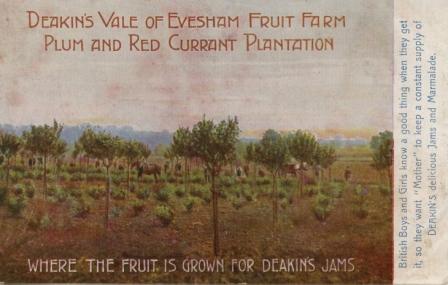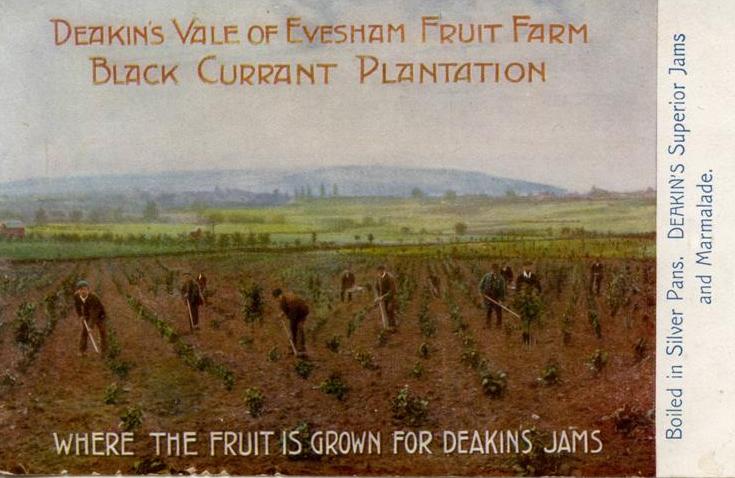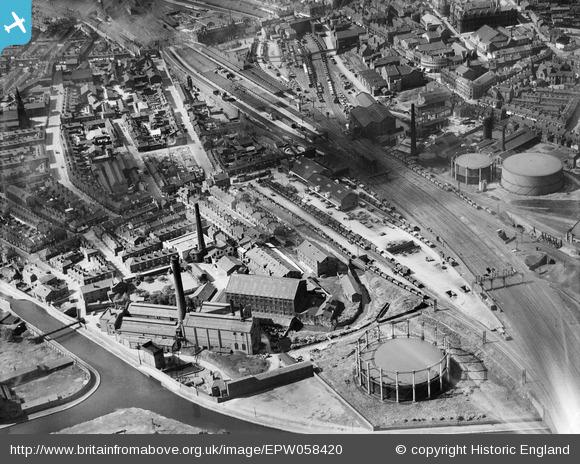A History of W.R. Deakin Limited
Deakin's English made Jams from English Fruit for English people
Deakin & Hodson (marmalade, preserves and yeast importers), Wigan, Lancashire
In the late 1880s, William Robert DEAKIN (1862-1943) set up his first marmalade and preserves manufacturing business and yeast importers, Deakin & Hodson, at Henhurst Bridge Mill, Chapel Lane, Wigan, in partnership with his father Samuel Pownall DEAKIN (1839-1929) and brother-in-law John Hartley HODSON (1867-1939), a former apprentice tea dealer.
The Deakin Hodson partnership was dissolved by mutual consent on 31st December 1890 and it was agreed on dissolution of the partnership that all debts due and owing to and by the firm would be received and paid by William Deakin. John Hodson returned to yeast importing.
W.R. Deakin (jam and marmalade manufacturers) - Wigan, Pershore and Toddington
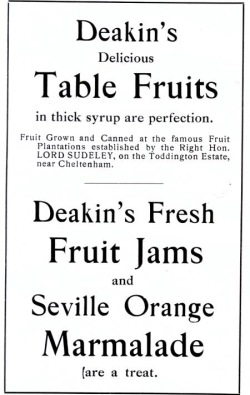 Following the dissolution of the partnership with John Hodson, William Deakin set up his own jam manufacturing business, W.R. Deakin, with jam and marmalade production taking place in the jam works on the opposite side of Chapel Lane in Wigan, at the Eclipse Preserve Works in Bradford Place. William became a successful, well respected Wigan businessman, a Wigan Borough magistrate (JP) and Town Councillor.
Following the dissolution of the partnership with John Hodson, William Deakin set up his own jam manufacturing business, W.R. Deakin, with jam and marmalade production taking place in the jam works on the opposite side of Chapel Lane in Wigan, at the Eclipse Preserve Works in Bradford Place. William became a successful, well respected Wigan businessman, a Wigan Borough magistrate (JP) and Town Councillor.
As well as a home in Wigan, William's family also had a residence in Southport, Lancashire, where in September 1893 William hosted his firm's annual picnic in a field adjacent to the house.
The business grew rapidly, employing around 70 workers by 1897. William rewarded his factory staff well, paying good wages and even reducing the working hours between October and June without reducing pay levels. He was know for fostering good working relationships, encouraging his staff to show great pride and interest in their work. At an annual staff picnic in September 1897[1], William spoke of the rapid increase in the number of Deakin's employees but announced that "it was not his desire to make money so much but to leave people better than when he found them". In reducing the working day William hoped it would leave his staff "more time for recreation and intellectual cultivation." The annual picnics were quoted as being jolly affairs with cricket matches (married men v the single men), dancing and singing and were reported as being much enjoyed by employer and employee alike.
Throughout the 1890s Deakin's flourished and William diversified into fruit farming. William's first venture into growing fruit was at Hampton Park Estate, just outside the market town of Evesham, in the Vale of Evesham in what was once known as 'The Garden of England'. The 240 acre estate at Hampton (main house pictured below), bordered by the River Avon, was transformed by William from pasture to acres of fruit. By 1908, 40 acres of raspberries, 50 acres of strawberries, 35 acres of black and red currants, 20 acres of gooseberries and 40 acres of plums were grown across the estate.
Deakin's supplied marmalade and jams to the British Government for the troops fighting in South Africa during the Second Boer War (1899-1902) and William received many letters of appreciation from the front.
Deakin's continued to expand in the early 1900s and William purchased The Hall at Pershore where he also transformed the gardens and surrounding fields into 180 acres of fruit. The Mount Pleasant orchards surrounding The Hall were home to apples, strawberries, raspberries, gooseberries, loganberries (at the time a new fruitcross between the blackberry and raspberry which William experimented with), red and black currants and a few cherry trees. The family continued to maintain their residence in North Meols, Southport,Lancashire as well as in Wigan.
On 8th June 1903, WR Deakin became a limited company (no. 77679). The company took over the business run by William Deakin and continued to manufacture jam, preserves, marmalade, and pickles at The Eclipse Jam and Marmalade Works, Wigan. 60,000 £1 shares (25,000 preference and 35,000 ordinary shares) were issued and the main shareholders were: William Robert Deakin (Governing Director of Gidlow Lodge, Wigan), Mary Jane Deakin (of Gidlow Lodge, Wigan), George Edward Deakin (Director and Traveller of Ivy Cottage, Gidlow, Wigan), Charles Albert Goldthorp (Cashier and Company Secretary of Springfield Drive, Wigan later Byle Cottage, Barnsley Street, Wigan), William Foster (Manager of Gidlow Lane, Wigan), Joseph Wyatt (Traveller of 43 Station Road, Cheadle Hulme, Cheshire) and John Taylor (Traveller of 227 Gidlow Lane, Wigan).
In 1904 the number of individual shareholders of the company had increased to 80[4] and included: John Fairhurst (Bookkeeper of 17 Lower Ground, Wigan) and several 'Travellers' (commercial travellers or salesmen) and grocers around the country.
Deakin's jam business expanded and the company also bottled fruit and supervised the making of the 'Little Participator' jellies. In the summer of 1907, Deakin's diversified into canning fruit and vegetables at Naunton Field, Toddington, Gloucestershire, following the acquisition, in 1904, of the Toddington Jam Factory at Toddington, Gloucestershire, from Messrs T.W. Beach and Sons Ltd when Beach's moved their business back to Evesham. The canning factory at Naunton Fields was initially managed by George Edward Deakin. The Evesham Journal reported on 20th April 1907:
As is well known the firm has a jam factory at Wigan are building a new factory at Gatley, Cheshire, and own fruit farms at Hampton Park, near Evesham, and Mount Pleasant, Pershore. They will commence canning operations during the coming season. The development of such an industry in the Vale is bound to be of benefit of growers, and we wish the firm every success in their new enterprise.
Fruit for the Toddington jam and canning factories were grown in orchards on Lord Sudeley's Toddington Estate (now under the ownership of the industrialist Hugh Andrews), at one time the largest fruit farm in England covering some 1000 acres by 1911. The nearby Great Western Railway (GWR), which had purchased the railway line through Toddington in 1906, was used to transport the fruit and canned produce. Deakin's also used the station at Beckford on the Birmingham and Gloucester Railway connecting with Evesham. Deakin's had entered into a private siding agreement with the GWR to operate a siding at Evesham Station which opened on 17th July 1907. This arrangement terminated on 17th May 1935.
The planned jam factory at Gatley, Cheshire, (designed by Bolton arhictects Jonas, James & Bradshaw) was never built. The land at Gatley had been purchased in early 1905. The site was considered ideal as it was served by railways on 3 sides and within 7 miles of Manchester where Deakin's business was expanding rapidly. At the time of purchase, however, the cost of sugar was rising so it was decided to delay the building of the jam factory and fruit was planted that autumn instead. Other properties and land were also purchased by Deakin's in Stockport Etchells. Eric Chandley recalls in The Chandley Chronicles:
On the other side of the railway was a large field full of apple trees and raspberry canes. We used to go and pick raspberries and get 1/2p a pound. This was under the arches of the LMS railway from Manchester to Wilmslow. A jam factory should have been built by Deakins but they couldn't get permission because of Barnes' Hospital. Everything was ready, even the bricks, but it didn't get any further.
On 10th March 1914, Joseph Wyatt (of Styal Road, Gatley, Cheadle) and John Bertram Deakin (Works Manager, of The Bungalow, Dalton, Parbold, Wigan) were appointed directors of W.R. Deakin Ltd and George Edward Deakin resigned. William Deakin's younger sons William George Deakin (of Canning Factory, Toddington near Winchcombe, Gloucestershire) and George Deakin (of Stone House, Whittington, Worcester) were later appointed directors, William George Deakin resigned as a director on 30 November 1923.
W.R. Deakin Limited - 1915 to 1936
During the First World War, Deakin's supplied canned meat (corned beef or bully beef as it was known), vegetables, jams and marmalade to the army. They received a contract from the War Office for over 300 tons of jam for the British Army to be delivered by the end of 1914. The jam was delivered in 700,000 1lb tins packed in 14,000 special War Office export crate and was made at the canning factories at Wigan and Toddington at a rate of 40,000 tins per day. Many of the men who worked in the Deakin factories enlisted or were conscripted during the war and William Deakin often appeared at the Military Tribunals appealing against their conscription.
The Toddington canning factory (at Naunton Fields) is mentioned in A History & Memories of Toddington compiled by the Toddington Women's Institute which describes the canning factory (which employed over 200 women and men including butchers to cut up the meat) receiving supplies of meat and coal in drays from Toddington and Beckford Stations and producing the tins (up to 40,000 2lb tins in one day[2]). The beef was imported from Argentina. John Bertram Deakin (William's son) later oversaw the operations in Buenos Aires (John Bertram Deakin and his family lived in Buenos Aires between 1929 and 1933). His brother William George Deakin managed the Toddington factory after the war until its closure in the early 1920s[3].
Of note in the expansion of the Deakin business is the purchase on 18th July 1917 by William of the Stoulton Estate, Worcestershire, from Lady Henry Somerset. Formerly part of the Eastnor Castle Estate, the land comprising 2,800 acres included orchards across the parishes of Stoulton, Pershore, Norton Juxta Kempsey and Kempsey, Norton Hall and various cottages. William's existing fruit orchards in Pershore were a great success and Pershore was renowned for its good fruit crops with many of the town's inhabitants being employed in market gardening and fruit farming. It is recorded in 1913, that the 1,959 acres making up Stoulton Parish were mainly arable producing crops of wheat, beans, barley, turnips and fruit, with 961 acres of permanent grassland and 16 acres of woodland and that the land around Kempsey and Norton Juxta Kempsey produced crops of wheat, barley and beans. It can probably be concluded that Deakin's extended the fruit orchards and started vegetable canning alongside its fruit canning and preserving.
The business, however, was not without its setbacks. On Wednesday 19th September 1917, Deakin's Jam Factory at the Eclipse Works, Bradford Place, Wigan, suffered serious fire damage costing several hundreds of pounds. The fire started around 10pm in one of the boiler flues, spreading to the boiler room and wash house. Fortunately the fire was contained within 40 minutes preventing what could have been one of the most disastrous fires in Wigan. Fire crews from Borough Fire Station attended the blaze.
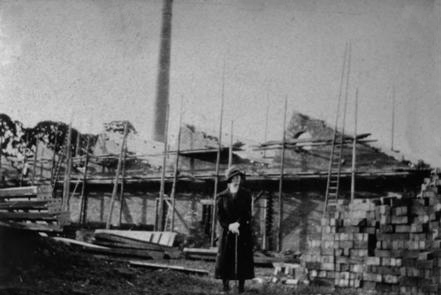 Deakin's also built a canning factory at Norton Juxta Kempsey in Woodbury Lane, opposite the Deakin family home, Norton Hall (image left: Mary Jane Hartley Deakin photographed in front of the building of the canning factory). The bricks used to build the factory came from the nearby brickworks which had also been purchased by William Deakin. The cans for the jam factory were produced by a firm in nearby Worcester which later became part of the Metal Box Company Ltd. The jam factory, which was sold for the sum of £2000 in 1936 as part of the winding up of W.R. Deakin Ltd (see below), was later requisitioned by the Army during the 1940s as an extension to Norton Barracks and later became the site for Morganite Crucible.
Deakin's also built a canning factory at Norton Juxta Kempsey in Woodbury Lane, opposite the Deakin family home, Norton Hall (image left: Mary Jane Hartley Deakin photographed in front of the building of the canning factory). The bricks used to build the factory came from the nearby brickworks which had also been purchased by William Deakin. The cans for the jam factory were produced by a firm in nearby Worcester which later became part of the Metal Box Company Ltd. The jam factory, which was sold for the sum of £2000 in 1936 as part of the winding up of W.R. Deakin Ltd (see below), was later requisitioned by the Army during the 1940s as an extension to Norton Barracks and later became the site for Morganite Crucible.
During the 1930s depression, fruit and vegetable businesses across the Vale were struggling to compete with the cheaper imports from overseas and an increasing demand for more exotic fruits. Supply often outstripped demand and following a fall in sales, accumulated losses and a reported canning disaster at the Norton factory, W.R. Deakin Limited initially filed for members' voluntary winding up in May 1935. Charles Albert Goldthorp (retired cashier and company secretary of 116 Bevendean Crescent, Brighton) was elected to the board on 12 October 1935 and a further filing for winding up of the company was filed the following year after an Extraordinary General Meeting of the company on 24th June 1936.
It was announced on 18th September 1936 that the Eclipse Works, Bradford Place, Wigan, used by W.R. Deakin Ltd in jam production and fruit bottling for 50 years had been sold by auction for £3,000. Plant, machinery and land (part freehold and part leasehold) were included in the sale.
G. & J.S.Deakin - 1936 to 1955
The Deakin jam business continued to trade from the Eclipse Works (see photo from 1938 above) under George Deakin and James Stanley Deakin in the name of G. & J.S. Deakin Limited. John Hartley Deakin (son of James Stanley Deakin) was also a director of the company. At an Extraordinary General Meeting on 28 March 1955 it was agreed that the business should be liquidated and the company wound up voluntarily.
From a Deakin postcard advertisement:
'British Boys and Girls know a good thing when they get it, so they want
"Mother" to keep a constant supply of DEAKIN'S delicious jam and marmalade.'
[1]: In September 1897, the annual staff picnic was held in Ruffkin near Ormskirk, with tea provided by Mr Ashcroft of the Hesketh Arms. Mr Albert Webster, Mr Richard Lewis and Mr Peter Ashcroft all Deakin's employees attended.
[2]: Source: A History & Memories of Toddington A Gloucestershire Village compiled by the Toddington Women's Institute.
[3]: Source: Kelly's Directory 1914 - Deakin W.R. Ltd., Winchcombe, fruit preservers.
[4]: By 1924 there were nearly 150 individual shareholders of W.R. Deakin Ltd.
Images: Copyright and courtesy of Deborah J.T. Williamson and Deakin's advertisement courtesy of Wigan World.
